Cheers for Miss Bishop

Brief Synopsis
Cast & Crew
Tay Garnett
Martha Scott
William Gargan
Edmund Gwenn
Sterling Holloway
Dorothy Peterson
Film Details
Technical Specs

Synopsis
In 1929, in Maple City, elderly Sam Peters visits his childhood friend, Ella Bishop, whom he had always hoped to marry, and awakens her from a nap. Ella has been reminiscing about her life, and continues now with Sam, recalling the September day in 1879 when she enrolled at the newly-opened Midwestern University: Ella excitedly runs to Midwestern, a university built in the middle of cornfields, and encounters the immigrant janitor, Chris Jensen, who says he has just been promoted to gardener. Ella arrives in time to hear President Corcoran's speech, in which he says that education is the road to freedom. At home later that day, Ella's cousin, Amy Saunders, an irrepressible flirt, leaves her chores to go out for ice cream with neighbor boy Buddy Warner, and when Sam, who delivers groceries, pulls up, Ella tells him her dreams of becoming a teacher. Sam is in love with Ella, and has his own dreams of owning a grocery, but Ella is not in love with Sam. After four years, Ella graduates with honors, and Corcoran asks her to teach English at the university. Corcoran's offer is the fulfillment of a dream for Ella, and she approaches each student as an individual, pressing for an astronomy course for Anton Radchek, and urging Minna Fields, who possesses a remarkable memory, to strive for a degree as a librarian, even though she speaks poor English. One night in 1883, Ella is unable to attend a concert with Sam because of a sore throat. When she puts a pot of maple candy on her snowy roof to harden, she is accidentally locked outside and calls to a stranger on the sidewalk for help. Delbert Thompson, a new lawyer in town, comes to her aid and brings a ladder to help her down. Ella and Delbert immediately take to each other, and in 1884, they become engaged. One night, Ella breaks a date with Delbert so that she can defend Minna against an accusation by the faculty that she cheated on a test. While Ella is proving that Minna is not only honest, but appears to have been cheating only because she has a photographic memory and transcribed exactly what she read, Delbert allows himself to be seduced by jealous Amy. Ella is deeply shocked by Amy and Delbert's betrayal, and Sam later forces the couple to marry and move out of town. Ella thinks of resigning from the college to move to New York, but Corcoran convinces her that she has a gift for teaching, and she remains. In the winter, Amy returns home pregnant, having been abandoned by Delbert. Amy dies during childbirth, and Ella and her mother rear her daughter Hope as their own. Many years pass, and in 1899, Hope is enrolled as a student at Midwestern, and has fallen in love with fellow student Richard Clark. Sam, who owns his own grocery business and a new "horseless carriage" for deliveries, still quietly hopes to marry Ella. However, Ella has fallen in love with married professor John Stevens, who shares her love for literature. Few know about their discreet relationship, which Ella breaks off when John's wife finally refuses to consent to divorce for religious reasons. John leaves the university, Hope and Richard become engaged, and Ella gives Hope the wedding dress she had once readied for her own marriage. In 1906, Corcoran returns from an extensive holiday in Europe, and tells Ella that John died there in a train accident. Corcoran, now elderly, resigns his presidency and turns it over to newcomer Watts. Ella has lost her spirit for teaching and clashes with Watts over his attempts to modernize the curriculum. Corcoran consoles Ella after Watts suggests that she resign, but hints that she, like the college, needs modernizing. Ella takes his advice to heart, purchases an automobile, and apologizes to Watts, who becomes her friend. In 1917, Corcoran dies and World War I takes many of the university's male students. The next year, Ella's mother dies, and Hope and Richard move to California, where they have a baby girl, Gretchen. By 1934, Gretchen is a sophomore at Midwestern and seeks Ella's advice when she falls in love with a married man. Although Gretchen assumes that her spinster aunt has never known love, Ella gives her advice from her heart, and Gretchen decides not to pursue the relationship. Now elderly, Ella retires. One of the oldest buildings at Midwestern is slated for razing to make way for a new structure, and the news coincides with an alumni banquet. Because Ella is so upset that the building is to be demolished, she decides not to attend the banquet until Gretchen surprises her with a visit from Hope and Richard. When they arrive at the banquet hall, Ella discovers that the banquet is being held in her honor, and she is surprised to see many of her former students there, including Nobel prize-winning astronomer Anton Radcheck, renowned historian Minna Fields, and Senator "Snapper" MacRae, who once was an ignorant country boy. Ella is granted an honorary doctorate and recalls Corcoran's opening speech for the university: "Wisdom is the first cousin to freedom, and freedom is the glory of our nation and our people." Ella returns home with Sam, as always, by her side.

Director

Tay Garnett
Cast

Martha Scott
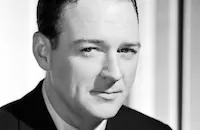
William Gargan

Edmund Gwenn

Sterling Holloway

Dorothy Peterson
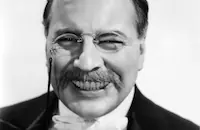
Sidney Blackmer

Mary Anderson

Donald Douglas
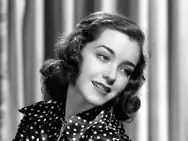
Marsha Hunt

Ralph Bowman
Lois Ranson

Rosemary De Camp
Knox Manning

John Arledge
Jack Mulhall
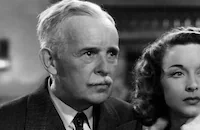
Howard Hickman
Helen Mackellar

William Farnum
Anna Mills

John Hamilton

Pierre Watkin
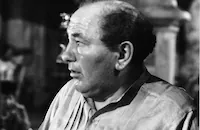
Charles Judels
Sue Moore

Rand Brooks
Charles Smith
Clarence Hennecke
Crew
Stephen Vincent Benet
Joseph C. Boyle
Don Cash
William Claxton
Sheridan Gibney
Sherman A. Harris
Gordon W. Hedwig
Richard Heermance
Adelaide Heilbron
Julia Heron
Hal Mohr
Marshall A. Neilan
Richard A. Rowland
Irene Saltern
John Ducasse Schulze
Earl Sitar
Edward Ward
David C. Werner
Grant Whytock

Film Details
Technical Specs

Award Nominations
Best Music Original Dramatic Score
Articles
Cheers For Miss Bishop
A graduate of a midwestern university (Michigan), Scott worked in stock, and became a star in her first Broadway play, Thornton Wilder's Our Town (1938). She repeated the role of Emily Webb in the film version of that play, and was nominated for an Academy Award for her performance. Cheers for Miss Bishop was Scott's third film. Scott's film career included playing Charlton Heston's mother twice, first in The Ten Commandments (1956) and later in Ben-Hur (1959). She also worked extensively in theater and television, and was one of the founding members, with Robert Ryan and Henry Fonda, of the Plumstead Playhouse theater company. Scott was one of the producers of the film version of a Plumstead play, First Monday in October (1981), and played an uncredited cameo in that film.
According to Cheers for Miss Bishop director Tay Garnett, it was Scott who recommended stage and radio actress Rosemary DeCamp for the key role of a Scandinavian immigrant student inspired by Miss Bishop. It would be DeCamp's film debut. The following year, she appeared in her best known film, Yankee Doodle Dandy (1942), as George M. Cohan's mother.
The role of Ella Bishop's lifelong suitor, the grocer Sam Peters, was an uncharacteristically gentle character for William Gargan. He usually played cops, soldiers, or gangsters, tough guys on both sides of the law. Gargan played sleuth Ellery Queen in a b-movie series in the 1940s, and detective Martin Kane in a television series in the 1950s.
Director Tay Garnett had gotten his start as a gag writer for Mack Sennett and Hal Roach, and had begun directing in the late silent era. He was equally at home in a variety of genres, from action-adventures like China Seas (1935), to romances like One Way Passage (1932), and Americana like Cheers for Miss Bishop. His best known film is the seminal film noir The Postman Always Rings Twice (1946).
Garnett sent a second-unit crew to Lincoln, Nebraska to shoot background footage of The University of Nebraska, which would stand in for Cheers for Miss Bishop's "Midwestern University." His second-unit director was a fellow silent-film veteran Marshall "Mickey" Neilan, who had been one of the silent era's top directors. A former actor, Neilan directed some of Mary Pickford's best films, including Rebecca of Sunnybrook Farm (1917) and Daddy-Long-Legs (1919). Once married to actress Blanche Sweet and a former lover of Gloria Swanson, Neilan had become an undisciplined alcoholic, and had not adapted well to talking pictures. He'd been a hero of Garnett's, so even though it had been years since Neilan had directed, Garnett gave him a chance. The results were disastrous, and Neilan was replaced. Garnett would fight his own battles with alcohol before getting sober but Neilan never did.
Cheers for Miss Bishop earned Edward Ward an Academy Award nomination for Best Scoring of a Dramatic Film. It was a big year for Ward - he was also nominated for scoring two other 1941 films, Tanks a Million and All American Co-ed. (There were 20 nominees that year in the category. The winner was Bernard Herrmann, who won not for Citizen Kane, although he was nominated for that film, but for All That Money Can Buy AKA The Devil and Daniel Webster.) Ward earned seven Oscar® nominations between 1939 and 1944, including one for the score of Phantom of the Opera (1943).
Director: Tay Garnett
Producer: Richard A. Rowland
Screenplay: Stephen Vincent Benet, Adelaide Heilbron, Sheridan Gibney
Based on the novel by Bess Streeter Aldrich Cinematography: Hal Mohr
Editor: William F. Claxton
Costume Design: Irene Saltern
Art Direction: John DuCasse Schulze
Music: Edward Ward
Principal Cast: Martha Scott (Ella Bishop), William Gargan (Sam Peters), Edmund Gwenn (President Corcoran), Sterling Holloway (Chris Jensen), Sidney Blackmer (John Stevens), Mary Anderson (Amy Saunders), Dorothy Peterson (Mrs. Bishop), Donald Douglas (Delbert Thompson).
BW-95m.
by Margarita Landazuri

Cheers For Miss Bishop
Martha Scott, 1914-2003
Martha Ellen Scott was born in Jamesport, Missouri on September 24, 1914, and raised in Kansas City, where a high school teacher encouraged her interest in acting. She majored in drama at the University of Michigan and after graduation, she joined The Globe Theatre Troupe, a stock company that performed truncated Shakespeare at the Chicago World's Fair in between 1933-34. She went to New York soon after and found work in radio and stock before playing making her breakthrough as Emily Webb in Our Town. When the play opened on Broadway in February 1938, Scott received glowing reviews in the pivotal role of Emily, the wistful girl-next-door in Grovers Corners, New Hampshire, who marries her high school sweetheart, dies in pregnancy and gets to relive a single day back on Earth. Her stage success brought her to Hollywood, where she continued her role in Sam Wood's film adaptation of Out Town (1940). Scott received an Academy Award nomination for best actress and was immediately hailed as the year's new female discovery.
She gave nicely understated performances in her next few films: as Jane Peyton Howard in Frank Lloyd's historical The Howards of Virginia (1940), opposite Cary Grant; the dedicated school teacher in Tay Garnett's Cheers for Miss Bishop (1941) in which she aged convincingly from 17 to 85; and as a devoted wife to preacher Frederic March in Irving Rapper's warm family drama One Foot in Heaven (1941). Sadly, Scott's maturity and sensitivity ran against the glamour-girl persona that was popular in the '40s (best embodied by stars like Lana Turner and Veronica Lake) and her film appearances were few and far between for the remainder of the decade.
Her fortunes brightened in the '50s, when she found roles in major productions, such as a suburban wife trapped in her home by fugitives, led by Humphrey Bogart, in William Wyler's taut The Desperate Hours (1955) and played Charlton Heston's mother in the Cecil B. Demille's The Ten Commandments (1956) and again for William Wyler in Ben-Hur (1959). Scott found steady work for the next 30 years in matronly roles, most notably on television, where she played Bob Newhart's mother on The Bob Newhart Show (1972-1978) and the mother of Sue Ellen Ewing on Dallas (1978-1991). Her second husband, pianist and Pulitzer Prize-winning composer Mel Powell, died in 1998. Survivors include a son and two daughters.
by Michael T. Toole
Martha Scott, 1914-2003
Quotes
Trivia
Notes
According to a February 2, 1941 New York Times article, producer Richard A. Rowland first became interested in Bess Streeter Aldrich's novel as a film property in 1932. A synopsis in copyright records reveals that the film originally ended with "Ella Bishop's" death, as diagnosed by a physician. Copyright records also indicate that background shots of "Midwestern University" were filmed on location at the University of Nebraska in Lincoln, NE. A Hollywood Reporter news item noted that the film earned Hollywood Reporter's first prize for best picture, direction, screenplay, actress and incidental performance in its January Preview Poll. The picture was nominated for an Academy Award in the category of Best Scoring of a Dramatic Picture. Cheers for Miss Bishop marked actress Rosemary De Camp's feature film debut and Marshall Neilan's last directorial assignment. Martha Scott, William Gargan and Mary Anderson reprised their roles in a Lux Radio Theatre version of the film broadcast March 17, 1941.















